10,771 people reached on Lassi with Lavina FB page – 671 engagements
Sunita S. Mukhi, Harpreet Kaur and 16 others like it on Lassi with Lavina FB page
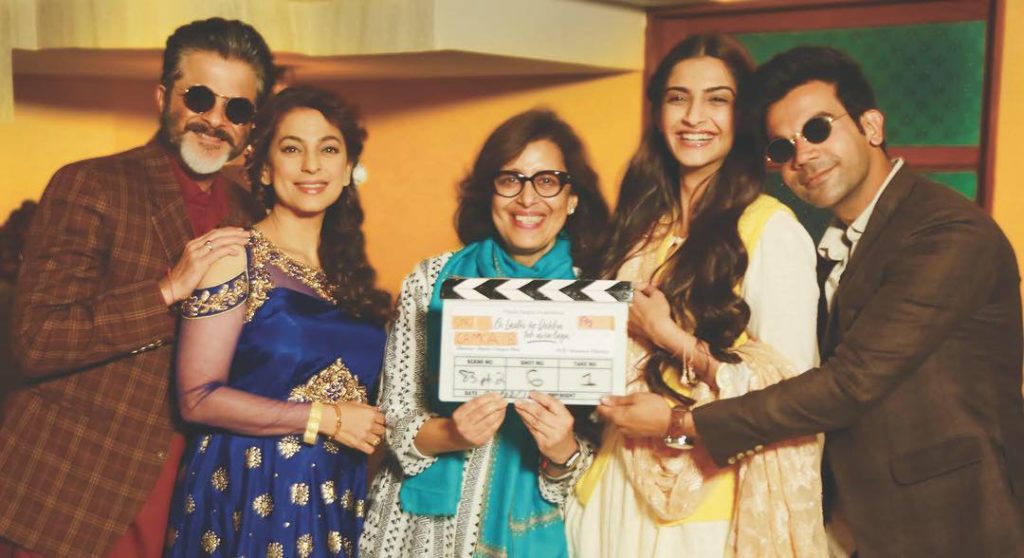
Shelly Chopra Dhar:
Empowering People to be Their True Selves
[dropcap]S[/dropcap]helly Chopra Dhar is all about breaking stereotypes. She proves that everyone has one life to live and can do anything with it. Dhar, 62, is the debutante director of ‘Ek Ladki Ko Dekha To Aisa Laga’ and attended film school only when her fourth and youngest child was in middle school. She pooh-poohs conventionally held ideas of ageism, and says, “I believe in constant learning – I’m not intimidated by age or what people will say – that comes from my personality!”
A computer professional, she remade herself and attended The Motion picture Institute in Michigan and learned a whole new skill in her 50’s. She recalls, “After being a full time wife and mother and taking care of the kids for many years, I found it very exciting that I was on the verge of a new horizon with the ability to do anything I wanted.”
From being a wife and mother in Michigan to becoming a director on one of the biggest Bollywood films seems a big jump but Dhar has her links to the Indian film industry. She belongs to a film family – she is the youngest sister of seven brothers, the oldest being the noted filmmaker Ramanand Sagar and the youngest being Vidhu Vinod Chopra, equally noted. Her life has indeed run on two parallel tracks – Mumbai’s Bollywood and Michigan, where she lives with her family. Often the two worlds juxtapose, and have shaped much of her thinking.
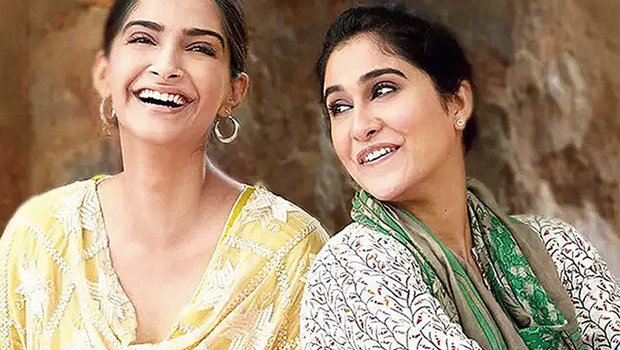
[dropcap]‘E[/dropcap]k Ladki Ko Dekha To Aisa Laga’ is produced by Vidhu Vinod Chopra and stars for the first time the father and daughter duo – Anil Kapoor and Sonam Kapoor – playing father and daughter. The film also stars Rajkummar Rao, Juhi Chawla and an ensemble cast. It is being lauded for its courage in dealing with a taboo topic and once again, Dhar has grappled the bull by the horns by taking on homophobia which affects so many families. Growing up in Mumbai she was always an activist on gay issues, often organizing street plays.
“I’ve felt for a long time that representation for this community has not been done at all in the mainstream in the way it should be done,” she says. “In the mainstream platform in India gay issues were either shown in a derogatory fashion or in a comic relief way in the portrayal of the characters. In parallel cinema you had films like ‘Fire’ and now ‘Aligarh’ but those were films with a serious take and very limited audience in a different style of cinema. So I felt it was important to have this subject be the first on the mainstream platform – it was intentionally, consciously written.”
This is the first time, the topic of same sex love is being shown as a love story in Bollywood with all its music and dance and drama. Dhar admits, “It is sugar-coated. I had to see what my goal was in making this film – my goal was to have it be accessible to as many people as possible.”
A Candid Chat with Shelly Chopra Dhar…
[dropcap]A[/dropcap]s she points out, issues change and then society changes. She recalls, “When I was 13, I had gone to a party and I saw a couple kissing. I could not take my eyes off them! I had never seen my parents kiss so this seemed very abnormal behavior. In the same way we are not able to digest same-sex couples because we have not seen same-sex couples. Today parents are grappling with this issue. Society as a whole does not know how to deal with it. I figured this was a socially relevant story to bring to the mainstream.”
Dhar’s hope is to change what is regarded as abnormal and give people more agency in their own lives – be it age, gender or the work people want to do. Being your authentic self has always been important to Dhar and there are several subplots in the film where she brings out these beliefs – While Sweety (Sonam Kapoor) has the biggest stress – not being able to come out of the closet to her conservative family who are always trying to find her a suitable boy, even our hero Sahil (Rajkummar Rao) has to contend with his father’s expectations – a millionaire filmmaker who scorns his son’s efforts to be a small-time playwright. Then there’s the business magnate Balbir Chaudhery (Anil Kapoor) who had to give up his dreams of becoming a chef because of his own mother’s firm belief that real men don’t cook.
[dropcap]“T[/dropcap]hese are different paradigms we grew up with in India which are very common – Boys don’t go to the kitchen – boys don’t cook. Balbir is 60 years old and men were brought up in a very different way,” she says, jokingly adding: “My brothers don’t even know how to bring a glass of water from the kitchen! It’s not that they are bad people – it’s just my mother never encouraged them to do that. It’s like they are taken care of. It’s the norm – and I tackled that.”
In the film, Juhi Chawla plays Chatro, the feisty caterer who falls in love with Balbir Singh. She has her own issues and failed dreams – she had wanted to be an actress but once again society did not permit her. Dhar of course knows of society’s resistance to a film career for women.
She recalls: “I was in and around films all my life. But where I come from, films and families were treated in a very conservative fashion and again I come from a family where it was very clear that girls don’t act in films – it was out of question for you to even think about it. I got offered some jobs in television as a voice artist and my family said no.”
The Legacy of a Film Family
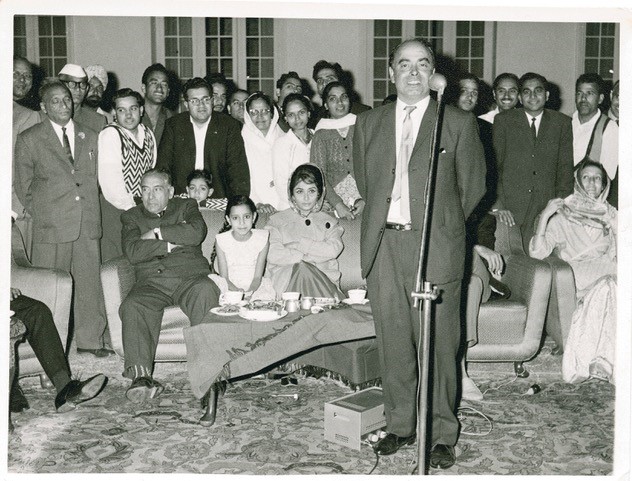
[dropcap]I[/dropcap] asked her about her life growing up in a famous film family and she had many charming stories to tell. She visited the sets all the time and her earliest memories are of visiting the sets of ‘Arzoo’ starring Sadhana and Rajendra Kumar, a film by her brother Ramanand Sagar. She says, “I have so many pictures with Sadhana and Rajendra Kumar, sitting with them, a little girl with two braids. That was the first time I flew in a plane from Srinagar to Delhi for the premiere of this film and then, believe it or not, they didn’t let me go to the premiere and I was instead sent to a park to play! I did get to go to the premiere of ‘Jab Jab Phool Khile’ and I literally sat in-between Shashi Kapoor and Nanda – I was the only little girl and you know how people are very nice to little girls!”
Another of her childhood film memories is connected with everyone’s heart-throb Dharmendra. She saw his film ‘Phool aur Pathar’ and when he died in the film, she cried and cried inconsolably because she thought he had really died. So her older brother finally picked her up and took her to Dharmendra’s home – he lived across the street – to show him that he was really alive. The superstar patted her on her head and all was well!
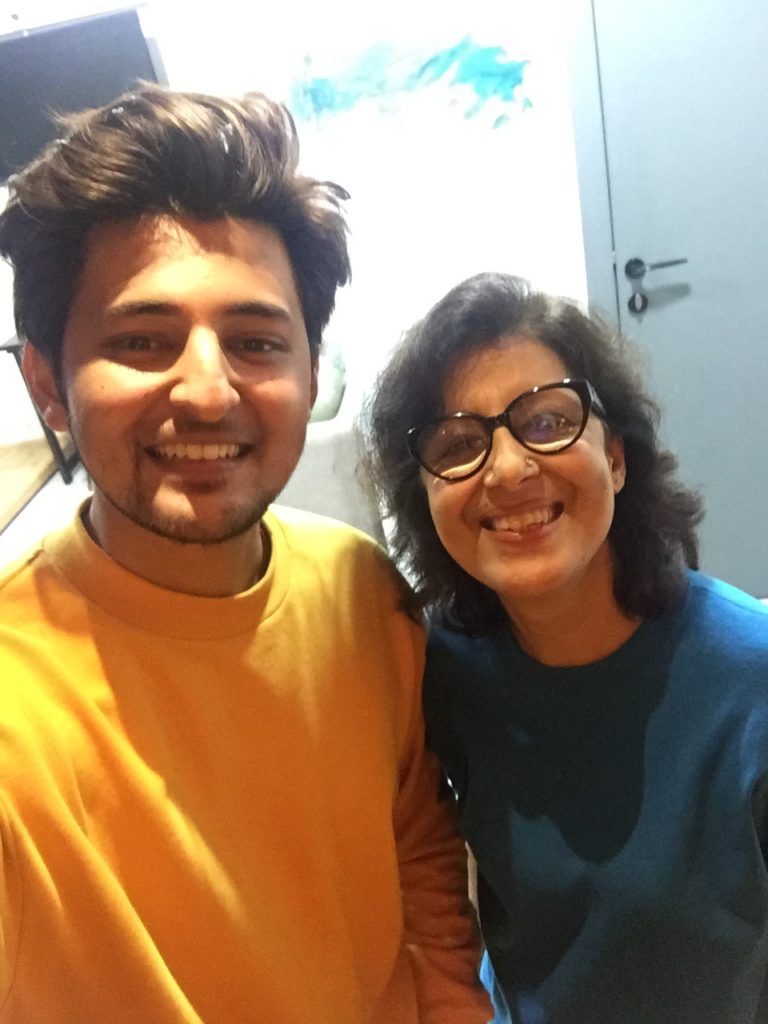
[dropcap]Y[/dropcap]ou see a lot of Bollywood touches in the current movie which even uses the song title of a 70’s film as its own title. Says Dhar: “Ek Ladki Ko dekha to Aisa Laga’ was such an iconic song. We did a new rendition of the song – it’s not a remix.” As for the script of the movie, Dhar writes about what she believes in and her collaborator Ghazal Dhaliwal, who is transwoman, work together on the scripts. They have earlier written two other scripts together. Says Dhar: “ Ghazal came to Michigan and stayed with me while we worked on the script of ‘Ek Ladki’. We have a rapport and good understanding with each other.”
The landscape is a welcoming one for ‘Ek Ladki Ko Dekha to Aisa Laga’ – Critics have been giving it really good reviews, people are enjoying it and recommending it to their families to see it. So what’s next for her? She says, “I have so many ideas so I think I will take a short break and de-compress a bit and will start working on a new story.”
Shelly Chopra Dhar has come belatedly into the world of cinema but she is a filmmaker to watch because you can expect thoughtful yet accessible cinema from her. “I think the role of a film maker is a very responsible one,” she says. “India is a country that is deeply into oral myths and folklore and storytelling. If you remember the Jataka tales, they were entertaining tales with a moral in the end. Then cinema came in and took over the role and became the largest social agent.”
Bringing about social change through cinema is this filmmaker’s passion and we can look forward to more celluloid tales with a deeper impact.
(This article first appeared in Khabar magazine, Atlanta)
Related Article:
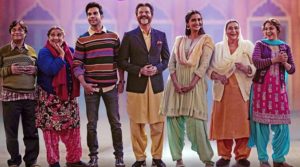

1 Comment
Pingback: | Lassi With Lavina